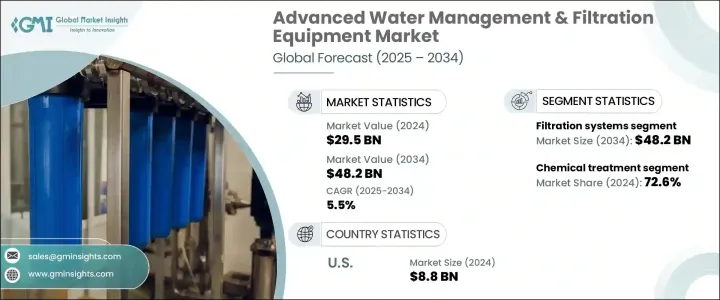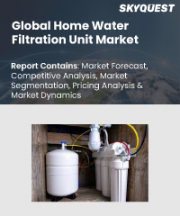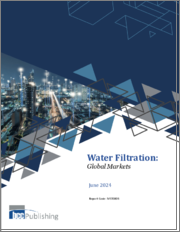
|
시장보고서
상품코드
1766273
첨단 물 관리 및 여과 장치 시장 : 기회, 성장 촉진요인, 산업 동향 분석, 예측(2025-2034년)Advanced Water Management and Filtration Equipment Market Opportunity, Growth Drivers, Industry Trend Analysis, and Forecast 2025 - 2034 |
||||||
세계의 첨단 물 관리 및 여과 장비 시장은 2024년 295억 달러로 평가되었으며 CAGR 5.5%로 성장해 2034년에는 482억 달러에 이를 것으로 추정됩니다.
이러한 성장의 원동력이 되는 것은 엄격한 환경 규제, 물 부족의 심각화, 각 업계의 지속 가능한 물 관리 솔루션의 필요성입니다. 이 지령에 의해 수처리 인프라나 기술에 대한 투자가 증가하고 있습니다.

이러한 세계의 규제 동향은 첨단 물 관리 솔루션 수요를 촉진하는데 있어서 컴플라이언스가 중요한 역할을 하고 있음을 뒷받침하고 있습니다. 산업계에서는 담수의 소비량을 삭감해 환경에 대한 영향을 최소한으로 억제하기 위해, 물 효율이 높은 기술을 채용하는 경향이 강해지고 있습니다.
| 시장 범위 | |
|---|---|
| 시작 연도 | 2024년 |
| 예측 연도 | 2025-2034년 |
| 시작 금액 | 295억 달러 |
| 예측 금액 | 482억 달러 |
| CAGR | 5.5% |
여과 시스템 분야는 2024년에 295억 달러를 창출했고, 2034년에는 482억 달러에 이를 것으로 예측됩니다. 여과 시스템은 입증된 효율성, 확장성 및 광범위한 용도에 대한 적응성으로 인해 주로 첨단 물 관리 및 여과 장치 업계에서 지배적인 지위를 차지하고 있습니다. 기계적 필터, 멤브레인 필터, 활성탄 필터와 같은 전통적인 여과 기술과 첨단 여과 기술은 시정촌 및 산업계의 수처리 공정의 기본 구성 요소로 작동합니다. 부유물질, 미생물, 화학 오염물질을 제거하는 능력은 규제 준수와 공중 보건의 안전을 보장하는 데 필수적입니다. 다른 시스템에 비해 여과장치는 모듈식으로 확장할 수 있으며 기존 인프라와 통합할 수 있으며 다양한 수질 매개변수에 맞출 수 있어 종합적인 수처리 전략의 첫 번째 방어 라인이 되었습니다.
화학처리 분야는 2024년에 214억 달러를 창출하여 72.6%를 차지했습니다. 그 범용성에 의해 지자체, 산업, 농업의 각 분야에서 식수와 폐수를 모두 처리할 수 있습니다.
미국의 첨단 물 관리 및 여과장치 시장은 2024년에 88억 달러로 평가되었고 2025년부터 2034년까지 5.2%의 연평균 복합 성장률(CAGR)을 보일 것으로 예측되고 있습니다.
세계의 첨단 물 관리 및 여과 장치 업계의 최고 기업은 Pentair plc, Xylem Inc., GEA Group AG, Pall Corporation, CDE Group 등입니다. Pentair plc는 인수를 통해 제품 포트폴리오를 확대하여 주택용 및 산업용 여과 솔루션을 강화하고 있습니다. GEA Group AG는 특히 식품, 유제품, 식음료, 화학, 생명 공학, 발효, 전분, 감미료 산업에서 교차 흐름 막 여과 기술 개발에 주력하고 있습니다.
목차
제1장 조사 방법과 범위
제2장 주요 요약
제3장 업계 인사이트
- 생태계 분석
- 공급자의 상황
- 이익률
- 각 단계에서의 부가가치
- 밸류체인에 영향을 주는 요인
- 업계에 미치는 영향요인
- 성장 촉진요인
- 업계의 잠재적 위험 및 과제
- 기회
- 성장 가능성 분석
- 미래 시장 동향
- 기술과 혁신의 상황
- 현재의 기술 동향
- 신흥기술
- 가격 동향
- 지역별
- 제품별
- 규제 상황
- 표준 및 컴플라이언스 요건
- 지역 규제 틀
- 인증기준
- Porter's Five Forces 분석
- PESTEL 분석
제4장 경쟁 구도
- 소개
- 기업의 시장 점유율 분석
- 지역별
- 북미
- 유럽
- 아시아태평양
- 지역별
- 기업 매트릭스 분석
- 주요 시장 기업의 경쟁 분석
- 경쟁 포지셔닝 매트릭스
- 주요 발전
- 합병인수
- 파트너십 및 협업
- 신제품 발매
- 확장 계획
제5장 시장 추계 및 예측 : 기기 종류별, 2021-2034년
- 주요 동향
- 여과 시스템
- 기계식 필터
- 멤브레인 필터
- 정밀 여과
- 한외 여과
- 나노 여과
- 역삼투
- 활성탄 필터
- 이온 교환 시스템
- UV 소독
- 오존 여과
- 첨단 산화 공정(AOP) 시스템
- 전기화학적 수처리 시스템
- 생물학적 처리 시스템
- 막 분리 활성 슬러지법(MBR)
- 이동상 바이오필름 리액터(MBBR)
제6장 시장 추계 및 예측 : 기술별, 2021-2034년
- 주요 동향
- 물리적 처리
- 화학 처리
제7장 시장 추계 및 예측 : 용도별, 2021-2034년
- 주요 동향
- 상업용
- 주택용
- 산업용
- 산업제조업
- 자동차
- 일렉트로닉스
- 식음료
- 펄프 및 종이
- 기타(섬유 등)
- 발전
- 석유 및 가스
- 기타(광업 등)
- 산업제조업
- 지자체
- 기타
제8장 시장 추계 및 예측 : 유통 채널별, 2021-2034년
- 주요 동향
- 직접
- 간접
제9장 시장 추계 및 예측 : 지역별, 2021-2034년
- 주요 동향
- 북미
- 미국
- 캐나다
- 유럽
- 독일
- 영국
- 프랑스
- 이탈리아
- 스페인
- 네덜란드
- 아시아태평양
- 중국
- 인도
- 일본
- 한국
- 호주
- 라틴아메리카
- 브라질
- 멕시코
- 아르헨티나
- 중동 및 아프리카
- 아랍에미리트(UAE)
- 사우디아라비아
- 남아프리카
제10장 기업 프로파일
- Alfa Laval AB
- Amiad Water Systems Ltd.
- Bluewater Group
- Calgon Carbon Corporation
- CDE Group
- Doosan Enpure
- GEA Group AG
- Hydranautics
- Kurita Water Industries Ltd.
- Lenntech BV
- MANN HUMMEL Water & Fluid Solutions
- Pall Corporation
- Pentair plc
- Toray Industries, Inc.
- Xylem Inc.
The Global Advanced Water Management and Filtration Equipment Market was valued at USD 29.5 billion in 2024 and is estimated to grow at a CAGR of 5.5% to reach USD 48.2 billion by 2034. This growth is driven by stringent environmental regulations, increasing water scarcity, and the need for sustainable water management solutions across industries. Governments worldwide are enforcing rigorous environmental regulations to combat water pollution and ensure the availability of clean water. These regulations necessitate the adoption of advanced water treatment and filtration systems across various industries. This directive has led to increased investments in water treatment infrastructure and technologies. Similarly, in Asia-Pacific, countries like China and India are introducing stricter wastewater discharge standards, prompting industries to upgrade their treatment facilities.

These global regulatory trends underscore the critical role of compliance in propelling the demand for advanced water management solutions. The escalating issue of water scarcity, exacerbated by climate change, population growth, and urbanization, is a significant driver for the adoption of advanced water treatment and filtration equipment. Industries are increasingly adopting water-efficient technologies to reduce their freshwater consumption and minimize environmental impact. Advanced treatment systems, such as membrane bioreactors and reverse osmosis units, enable the reclamation and reuse of wastewater, thereby conserving water resources.
| Market Scope | |
|---|---|
| Start Year | 2024 |
| Forecast Year | 2025-2034 |
| Start Value | $29.5 Billion |
| Forecast Value | $48.2 Billion |
| CAGR | 5.5% |
The filtration systems segment generated USD 29.5 billion in 2024 and is anticipated to reach USD 48.2 billion by 2034. Filtration systems hold a dominant position in the advanced water management and filtration equipment industry primarily due to their proven efficiency, scalability, and adaptability across a wide range of applications. Traditional and advanced filtration technologies-such as mechanical filters, membrane filters, and activated carbon filters-serve as foundational components in both municipal and industrial water treatment processes. Their capability to remove suspended solids, microorganisms, and chemical contaminants makes them indispensable in ensuring regulatory compliance and public health safety. Compared to other systems, filtration equipment can be modularly scaled, integrated with existing infrastructure, and tailored to varying water quality parameters, making it the first line of defense in comprehensive water treatment strategies.
The chemical treatment segment generated USD 21.4 billion in 2024 and held 72.6%. Chemical treatment dominates the advanced water management & filtration equipment industry due to its long-established effectiveness in addressing a broad spectrum of water contaminants. This technology employs chemicals such as coagulants, disinfectants, and pH adjusters to neutralize pathogens, remove suspended solids, and degrade organic pollutants efficiently. Its versatility allows the treatment of both potable and wastewater across municipal, industrial, and agricultural sectors. Chemical treatment processes, including coagulation-flocculation and chlorination, are deeply embedded in existing water infrastructure worldwide, benefiting from decades of proven reliability and regulatory acceptance, which sustains its leading market position.
U.S. Advanced Water Management & Filtration Equipment Market was valued at USD 8.8 billion in 2024 and is anticipated to register a CAGR of 5.2% between 2025 and 2034. The U.S. enforces stringent water quality standards through agencies like the Environmental Protection Agency (EPA), driving demand for advanced water management and filtration equipment. These regulations compel municipalities and industries to invest heavily in state-of-the-art treatment technologies to comply with limits on contaminants such as PFAS and lead, thus strengthening market growth. The U.S. possesses a well-developed water treatment infrastructure with significant integration of innovative technologies such as membrane filtration, advanced oxidation processes, and real-time monitoring systems. This technological leadership fosters early adoption and continuous upgrades, maintaining the country's dominant position in the market.
The top companies in the Global Advanced Water Management and Filtration Equipment Industry include Pentair plc, Xylem Inc., GEA Group AG, Pall Corporation, and CDE Group. These companies are recognized for their innovation and distribution capabilities in the water treatment sector. To strengthen their presence in the advanced water management and filtration equipment market, companies are adopting several key strategies. Pentair plc has expanded its product portfolio through acquisitions, enhancing its filtration solutions for residential and industrial applications. Xylem Inc. has introduced smart water management systems, integrating sensors, data analytics, and remote monitoring to improve operational efficiency in water treatment facilities. GEA Group AG focuses on developing crossflow membrane filtration technology, particularly in the food, dairy, beverage, chemical, biotechnology, fermentation, starch, and sweetener industries.
Table of Contents
Chapter 1 Methodology & Scope
- 1.1 Market scope and definition
- 1.2 Research design
- 1.2.1 Research approach
- 1.2.2 Data collection methods
- 1.3 Data mining sources
- 1.3.1 Global
- 1.3.2 Regional/Country
- 1.4 Base estimates and calculations
- 1.4.1 Base year calculation
- 1.4.2 Key trends for market estimation
- 1.5 Primary research and validation
- 1.5.1 Primary sources
- 1.6 Forecast model
- 1.7 Research assumptions and limitations
Chapter 2 Executive Summary
- 2.1 Industry 3600 synopsis
- 2.2 Key market trends
- 2.2.1 Regional
- 2.2.2 Product
- 2.2.3 Application
- 2.3 CXO perspectives: Strategic imperatives
- 2.3.1 Key decision points for industry executives
- 2.3.2 Critical success factors for market players
- 2.4 Future outlook and strategic recommendations
Chapter 3 Industry Insights
- 3.1 Industry ecosystem analysis
- 3.1.1 Supplier Landscape
- 3.1.2 Profit Margin
- 3.1.3 Value addition at each stage
- 3.1.4 Factor affecting the value chain
- 3.2 Industry impact forces
- 3.2.1 Growth drivers
- 3.2.2 Industry pitfalls & challenges
- 3.2.3 Opportunities
- 3.3 Growth potential analysis
- 3.4 Future market trends
- 3.5 Technology and innovation landscape
- 3.5.1 Current technological trends
- 3.5.2 Emerging technologies
- 3.6 Price trends
- 3.6.1 By region
- 3.6.2 By product
- 3.7 Regulatory landscape
- 3.7.1 Standards and compliance requirements
- 3.7.2 Regional regulatory frameworks
- 3.7.3 Certification standards
- 3.8 Porter's analysis
- 3.9 PESTEL analysis
Chapter 4 Competitive Landscape, 2024
- 4.1 Introduction
- 4.2 Company market share analysis
- 4.2.1 By region
- 4.2.1.1 North America
- 4.2.1.2 Europe
- 4.2.1.3 Asia Pacific
- 4.2.1 By region
- 4.3 Company matrix analysis
- 4.4 Competitive analysis of major market players
- 4.5 Competitive positioning matrix
- 4.6 Key developments
- 4.6.1 Mergers & acquisitions
- 4.6.2 Partnerships & collaborations
- 4.6.3 New product launches
- 4.6.4 Expansion plans
Chapter 5 Market Estimates & Forecast, By Equipment Type, 2021 - 2034 (USD Billion) (Thousand Units)
- 5.1 Key trends
- 5.2 Filtration systems
- 5.2.1 Mechanical filters
- 5.2.2 Membrane filters
- 5.2.2.1 Microfiltration
- 5.2.2.2 Ultrafiltration
- 5.2.2.3 Nanofiltration
- 5.2.2.4 Reverse osmosis
- 5.2.3 Activated carbon filters
- 5.2.4 Ion exchange systems
- 5.2.5 UV Disinfection
- 5.2.6 Ozone filtration
- 5.3 Advanced oxidation processes (AOPs) systems
- 5.4 Electrochemical water treatment systems
- 5.5 Biological treatment systems
- 5.5.1 Membrane bioreactors (MBR)
- 5.5.2 Moving bed biofilm reactor (MBBR)
Chapter 6 Market Estimates & Forecast, By Technology, 2021 - 2034, (USD Billion) (Thousand Units)
- 6.1 Key trends
- 6.2 Physical treatment
- 6.3 Chemical treatment
Chapter 7 Market Estimates & Forecast, By Application, 2021 - 2034, (USD Billion) (Thousand Units)
- 7.1 Key trends
- 7.2 Commercial
- 7.3 Residential
- 7.4 Industrial
- 7.4.1 Industrial manufacturing
- 7.4.1.1 Automotive
- 7.4.1.2 Electronics
- 7.4.1.3 Food & beverage
- 7.4.1.4 Pulp & paper
- 7.4.1.5 Others (Textiles, etc.)
- 7.4.2 Power generation
- 7.4.3 Oil & Gas
- 7.4.4 Others (Mining, etc.)
- 7.4.1 Industrial manufacturing
- 7.5 Municipality
- 7.6 Others
Chapter 8 Market Estimates & Forecast, By Distribution Channel, 2021 - 2034, (USD Billion) (Thousand Units)
- 8.1 Key trends
- 8.2 Direct
- 8.3 Indirect
Chapter 9 Market Estimates & Forecast, By Region, 2021 - 2034, (USD Billion) (Thousand Units)
- 9.1 Key trends
- 9.2 North America
- 9.2.1 U.S.
- 9.2.2 Canada
- 9.3 Europe
- 9.3.1 Germany
- 9.3.2 U.K.
- 9.3.3 France
- 9.3.4 Italy
- 9.3.5 Spain
- 9.3.6 Netherlands
- 9.4 Asia Pacific
- 9.4.1 China
- 9.4.2 India
- 9.4.3 Japan
- 9.4.4 South Korea
- 9.4.5 Australia
- 9.5 Latin America
- 9.5.1 Brazil
- 9.5.2 Mexico
- 9.5.3 Argentina
- 9.6 MEA
- 9.6.1 UAE
- 9.6.2 Saudi Arabia
- 9.6.3 South Africa
Chapter 10 Company Profiles (Business Overview, Financial Data, Product Landscape, Strategic Outlook, SWOT Analysis)
- 10.1 Alfa Laval AB
- 10.2 Amiad Water Systems Ltd.
- 10.3 Bluewater Group
- 10.4 Calgon Carbon Corporation
- 10.5 CDE Group
- 10.6 Doosan Enpure
- 10.7 GEA Group AG
- 10.8 Hydranautics
- 10.9 Kurita Water Industries Ltd.
- 10.10 Lenntech B.V.
- 10.11 MANN+HUMMEL Water & Fluid Solutions
- 10.12 Pall Corporation
- 10.13 Pentair plc
- 10.14 Toray Industries, Inc.
- 10.15 Xylem Inc.
















